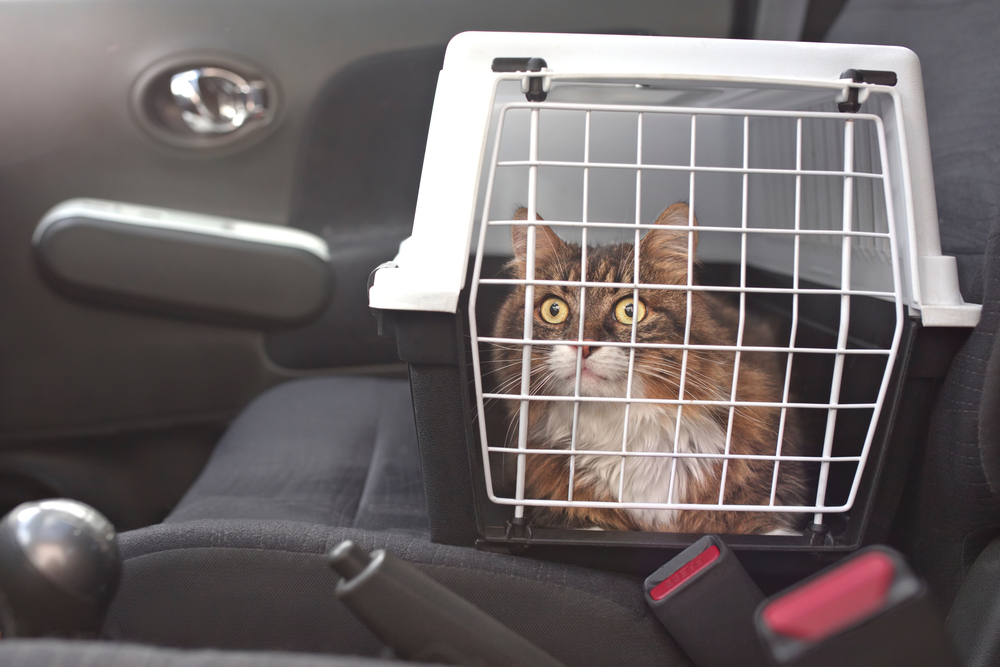As the summer heats up, so can your furry friend. Massachusetts summers may be fairly mild, but that doesn’t mean your pet can’t overheat, burn their paw pads, or scorch their exposed skin. When you venture out with your four-legged sidekick to enjoy the summer sun, you’ll need to take precautions so they stay safe and healthy. Keep these summer safety tips in mind, when you plan your next adventure together.
#1: Avoid exercising at peak heat times
Exercising in the heat of the day can set your pet up for heat exhaustion, or life-threatening heatstroke. If you religiously walk your dog at lunchtime, adjust your routine as temperatures spike, since your pooch may be left panting, weak, and feeling sick, if you insist on exercising under the midday sun. Beat the heat by rising early, and exercising before it gets too hot. If you’re not a morning person, shift your schedule to fit in an evening walk, right before the sun sets.
You’ll also need to keep an eye on your pet during playtime. As your pup runs after a frisbee, or cavorts with the dog next door, they likely won’t heed warning signs that they should slow down and take a break. You’ll need to be the voice of reason, and make your pooch rest in the shade before starting the next round of fetch.
#2: Help your pet chill out in the shade
On a hot day, you pick the shadiest spot in the yard for your lawn chair, or stay inside if there’s no shade. Your pet is no different, and shouldn’t be expected to spend the day outside in the scorching sun with no reprieve. Although your pet is fur-covered, exposed areas, such as their ears, nose, and belly, can develop a painful sunburn. And, that fur coat can cause your pet to overheat quickly, and develop heat exhaustion or heatstroke. Ensure your pet has adequate shade where they can rest while outside with the family, and don’t leave your pet outside for long, when you’re not around. If you can’t supervise your pup’s playtime, stick to short potty breaks only, and let them doze in front of the air-conditioning vent for the afternoon.
#3: Help your pet hydrate
You know that you should drink extra fluids on hot days, especially if you’re outside enjoying the sunshine. Your cupboard full of water bottles, and the refrigerator stocked with Gatorade for the kids’ soccer games, are proof that you know hydrating is important. But, like your goofy Labrador won’t know when it’s time to take a break from playing, they may also fail to stop at their water bowl to rehydrate. In addition to your two-legged children, you’ll need to ensure your four-legged pal keeps up with water intake on hot days. Keep a tip-proof bowl filled with cool water at all times, and encourage your pet to pause and take a drink often while out. If you head out for a hike, take plenty of water for all family members—two- and four-legged.
#4: Protect your pet’s paws
Have you ever run barefoot across the blacktop, on your tip-toes, so your feet didn’t burn? Now, imagine walking for a mile, or more, on the hot blacktop—yeowch! At Acorn Animal Hospital, we frequently treat pets with burnt paw pads in the summer months. Since we wear shoes, we often forget that when we walk our pets on the blacktop during the day, we are expecting them to expose their bare feet to a hot surface—over and over again. Before you set out on your next walk, place your hand on the sidewalk or road to test it—if you can’t hold your hand on the surface for 10 seconds, it is too hot for your pet, and you should move to the grass or a dirt path. Keep in mind that roads retain heat for hours, so also check your pet’s walking surface after the sun goes down, to prevent burns.
#5: Be aware of heat exhaustion signs
Be familiar with heat exhaustion signs, and watch your pet closely on hot days, so you’ll know when to call it quits and head inside. Heat exhaustion can come on quickly, and causes signs that may include:
- Excessive panting
- Thick, ropy drool
- Weakness
- Vomiting
- Diarrhea, which may be bloody or black
- Incoordination
- Collapse
- Seizures
Any pet can develop heat exhaustion, although some pets are at an increased risk, including:
- Brachycephalic (i.e., flat-faced) breeds, such as pugs and bulldogs
- Older pets
- Overweight pets
- Pets with a chronic or debilitating illness, such a heart disease, laryngeal paralysis, or tracheal collapse
If your pet shows heat exhaustion signs, take them into your air-conditioned home, place them in the bathtub, and run cool water over them. Never use cold water, or place alcohol on their extremities, as this causes surface blood vessels to constrict, shunting the heated blood to their internal organs. Placing wet towels over their body is also counterproductive, as they trap the heat. Once your pet’s temperature reaches 103 degrees, remove them from the water, dry them off, and head to Acorn Animal Hospital. Although the immediate danger may have passed, severe heat exhaustion (i.e., heatstroke) can cause organ damage that does not become outwardly apparent for several days. We will perform a thorough exam, and diagnostic tests, to evaluate your pet’s whole-body health, and determine whether supportive care is necessary, to prevent further organ deterioration.
#6: Never leave your pet in a parked vehicle

Although it should go without saying, we’ll still say it: Never, ever leave your pet in a parked car. The temperature inside a car can quickly climb to deadly levels on relatively cool days. A Pediatrics journal study demonstrated that the temperature inside a parked car on a sunny, 70-degree day can reach almost 100 degrees in only 20 minutes, and 113 degrees in 60 minutes. On hotter days, a car’s internal temperature can reach over 100 degrees in only 10 minutes, and cracking a window provides little relief. Leave your pet safely at home while you run errands, so you are not tempted to run into your favorite shoe store for “only a few minutes.”
Summer is a time for fun, not a pet emergency, so keep these tips in mind, as you enjoy the next few months of warm weather and sunshine. If you have questions about keeping your pet safe, or you think your pet may have scorched paw pads or heat exhaustion, contact Acorn Animal Hospital.
